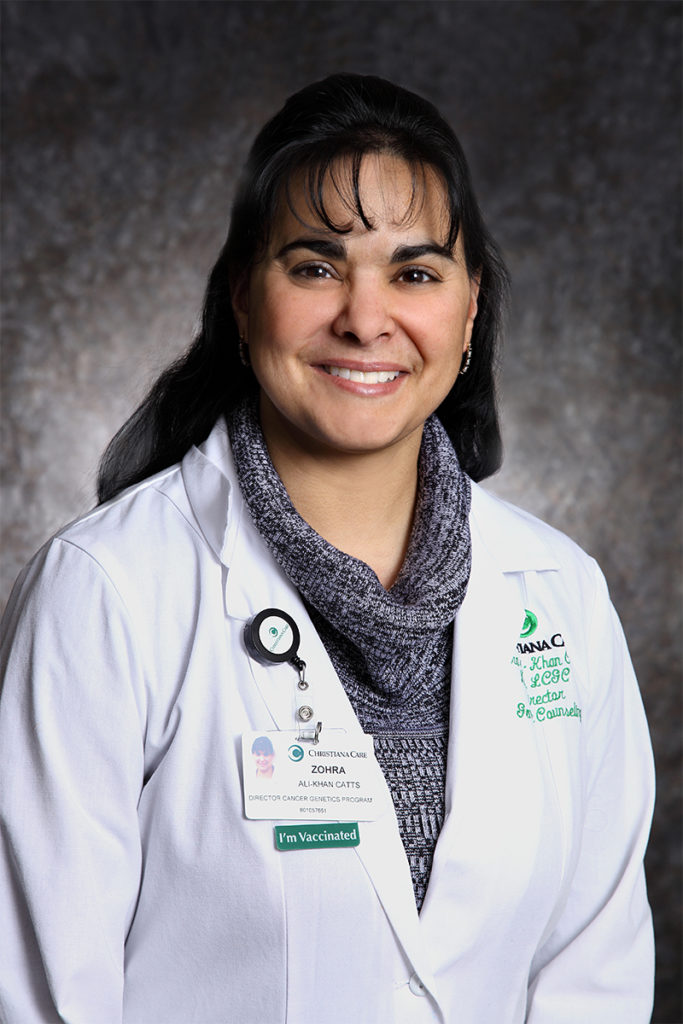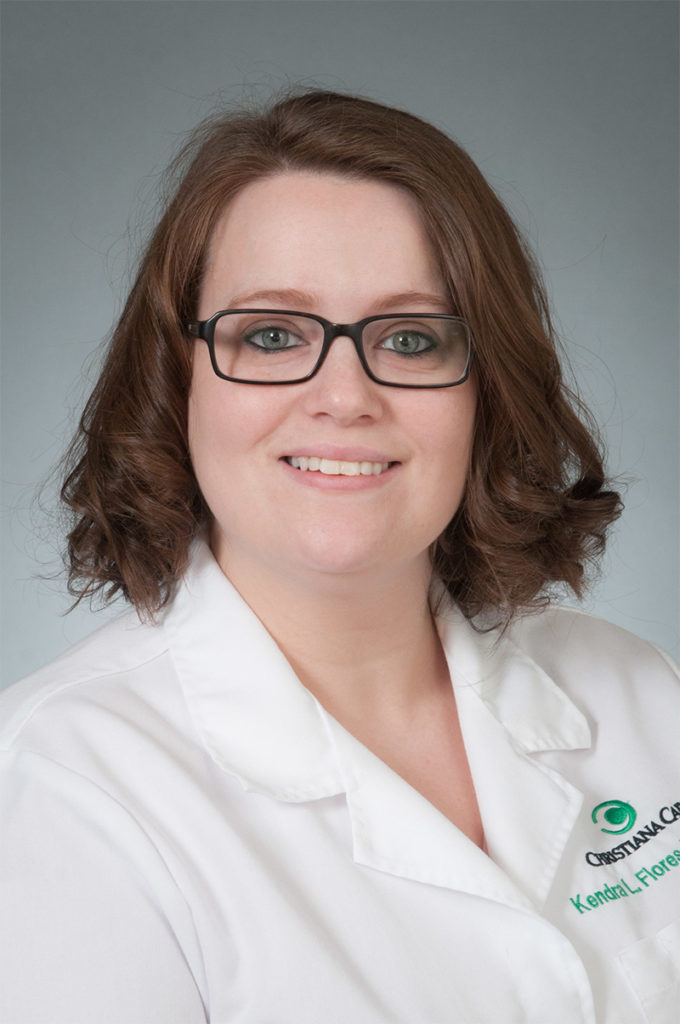Login
Genetic Counseling and Risk Assessment
Know Your Risk
We can’t change our family health history or our genetic makeup, but in health care, knowledge is power. When you know what your DNA says about how likely you are to develop a certain disease — and when you learn how to reduce your risks with healthy lifestyle choices — you and your doctor have the information you need to make the best decisions for your personalized health. And when the diagnosis is not what you had hoped for, genetic testing results may help your care team tailor your treatment plan.
Genetic consultation and genetic testing are so important. In just a few easy but thorough steps — a personal and family health history questionnaire, a simple blood or saliva test and a follow-up consultation — ChristianaCare’s genetic counseling experts can help you understand your personal risk and make informed treatment decisions for cancer, cardiovascular disease, neurogenetic diseases and prenatal testing.
Risk Assessments
Frequently Asked Questions
Deep within each of us are genes, chromosomes and DNA — a blueprint of information about you passed down from your mother and father and generations before them that determines traits like the color of your hair, whether you are left or right-handed or how tall you will be.
With the exception of identical twins, each person’s DNA is unique. Using a small amount of blood or saliva from our bodies, scientists can now determine if we inherited a medical disorder that runs in our family? Do we have a mutation or a “change” in our DNA sequence that makes us more likely to develop a disease?
Genetic testing looks at your genetic makeup — what makes you different from every other human being on this planet — to confirm or rule out whether you have inherited a condition from your ancestors, or if you are likely to develop or pass on a genetic disorder to your children. Some diseases can be passed down to a child from just one parent. Other diseases occur only when a child inherits a certain gene change from both parents.
Genetic testing also looks at changes, or mutations, in your own genes that make you more likely to develop certain diseases. We can’t control our genes, but we can use the incredible amount of information they hold deep within them to help make informed, effective decisions about our health care.
Our licensed genetic counselors are experts at providing comprehensive, confidential assessment of inherited and lifestyle risks for certain medical conditions. We offer genetic consultation and testing for cancer, cardiovascular disease, neurogenetic and other health conditions affecting adults. We also provide prenatal and preconception genetic consultation.
Does colon cancer run in your family? Did your grandfather and your great-grandfather have heart attacks at an early age? Your genetic counselor will collect your personal health information and draw a family tree of your family medical history. This map of the generations of your family, which is called a pedigree, helps you visualize patterns in generations of your family that may suggest a higher risk for hereditary cancer and/or other diseases.
While no test can tell you for sure that you will, or will not, develop a certain medical condition, the family tree created by a qualified genetic counselor lays the groundwork to help you and your doctor come up with the best plan for you.
People often decide to do genetic testing following diagnosis of a disease — breast cancer, for example — to help doctors determine the best course of treatment. Your genetic counselor will help you determine if you qualify for genetic testing, the best test for you based on your personal and family history, and may provide referrals to appropriate medical specialists or support services based on the information you provide.
If you and your genetic counselor do decide that genetic testing is right for you, you can give a blood or saliva sample right in the same building as your counseling appointment. We partner with certified laboratories that specialize in genetic testing and meet all federal standards defined under the Clinical Laboratory Improvement Act so you can be confident that your results will be accurate and handled professionally and your privacy will be protected.
Your genetic counselor will review the results of your genetic testing with you at a future appointment. Results usually take between three and six weeks depending on the test ordered. Your results appointment may include recommendations on ways to lower your overall risks for disease, as well as options for appropriate medical care or intervention. These recommendations are tailored to you based on your genetic test results, personal history and family history. Your counselor will also determine if you qualify for any available prevention or treatment research studies. As part of your genetic consultation, your family history is entered into Delaware’s high-risk family cancer registry where you can help scientists learn more about cancer patterns in our community and work toward new discoveries in cancer prevention, diagnosis and treatment.
Home-based DNA tests are growing in popularity as people trace their family ancestry and health risks. If your results from one of these tests indicate a genetic condition, you may wish to schedule a consultation to review those results with one of our licensed, expert genetic counselors and pursue further confirmatory genetic testing for medical management purposes. We can help you determine if genetic consultation and further testing will be covered by your insurance.
Based on the risk assessment of your personal and family history, your genetic counselor may recommend the option of genetic testing. Your counselor will discuss the genes associated with a particular health condition, as well as the risks, benefits and limitations of genetic testing.
The decision to have genetic testing is a highly personal one. Our genetic counselors will provide guidance and support as you make this important decision. The results you receive may affect how you and your doctor decide to manage your medical care and may drive recommendations for the care of your family members. Learning whether you do or do not carry a gene associated with a hereditary condition can bring peace of mind or it can be difficult information to hear. It can also lead to decisions about whether to share your results with your family members who may also be affected. In some cases, your genetic counselor may recommend that your family members consider being tested.
Our genetic counselors will also help you review insurance coverage and possible out-of-pocket responsibilities that may affect your decision about genetic testing.
ChristianaCare will keep your personal and family history — and your genetic testing results — strictly confidential. We will not release your personal results to anyone without your consent. Of course, you may decide to share your results with family members so they are aware of genetic conditions that may run in your family, but we will not release your personal results to anyone without you first authorizing us to do so.
It is important, however, to understand that your results will become part of your medical record and therefore may be available to your insurance company or an employer who provides your benefits. Your genetic counselor can help explain how this might affect you before you decide to go ahead with genetic testing.
Your genetic counselor will also discuss the rights and privacy protections covered under the laws of the Health Insurance Portability and Accountability Act (HIPPA) and the Genetic Information Nondiscrimination Act (GINA) of 2008.
Research scientists are constantly using DNA to unlock new mysteries about how our genes affect our health and to advance medical breakthroughs. In fact, much of this exciting work is happening right here at ChristianaCare in the Helen F. Graham Cancer Center & Research Institute’s Gene Editing Institute. Your test will look at the genes we know about at the time of your testing and the role those genes play in certain diseases. We encourage you to check in with your genetic counselor once a year — maybe around the time of your annual mammogram or yearly physical — to see if new tests, screening recommendations or treatments have become available that are recommended for you.
ChristianaCare's Genetics Team
Zohra Ali-Khan Catts, MS, LCGC
Director, Cancer Genetic Counseling
Zohra Ali-Khan Catts received her Bachelor of Arts degree in Biology with a minor in Chemistry and Spanish from the University of Delaware in 1992 and a Master’s of Science degree in Human Genetics with a concentration in Genetic Counseling in 1995 from Howard University. She is certified by the American Board of Genetic Counseling.
Ms. Ali-Khan Catts came to ChristianaCare’s Helen F. Graham Cancer Center & Research Institute in 2002 from the Children’s Hospital of Central California. As ChristianaCare’s director of genetic counseling, she developed the Familial Cancer Risk Assessment Program and the Ruth Ann Minner High-Risk Family Cancer Registry.
She is an adjunct scientist in the College of Arts and Sciences at the University of Delaware and is a mentor for undergraduate students from University of Delaware, University of West Virginia and Dartmouth College. In addition, she is the primary supervisor for genetic counseling graduate students from Arcardia University and has been a thesis committee member for several genetic counseling graduate students from Arcadia University and University of Maryland.
She also now serves as co-director of a new partnership between ChristianaCare and Thomas Jefferson University’s Jefferson College of Biomedical Sciences for a Human Genetics & Genetic Counseling master’s degree program to prepare the next generation of genetic counselors.

Kendra L. Flores, MS, LCGC
Licensed Genetic Counselor
Kendra Flores received her Bachelor of Science in Biology from Syracuse University in 2010 and Masters of Science in Genetic Counseling from Howard University in 2012. She is certified by the American Board of Genetic Counseling.
Ms. Flores joined ChristianaCare’s Helen F. Graham Cancer Center & Research Institute in September 2016. She is an adjunct professor at Thomas Jefferson University, Human Genetics and Genetic Counselor Program. Previously she practiced at UMass Memorial Medical Center where she provided clinical prenatal, cancer, and general genetic counseling. She also served as a clinical instructor of pediatrics at University of Massachusetts Medical School.

Contact Us
Talk with a qualified genetic counselor today about whether genetic testing is right for you. To schedule a confidential consultation, call 302-623-4593, option 1, or toll-free at 1-800-811-8116.

